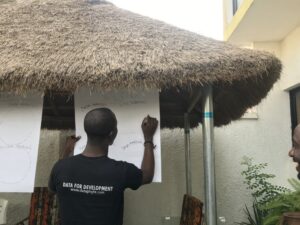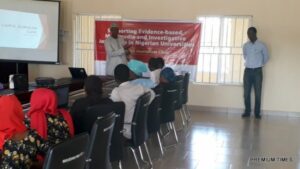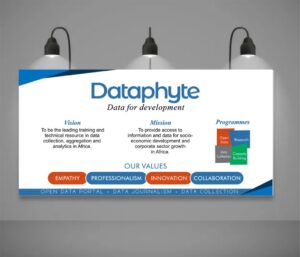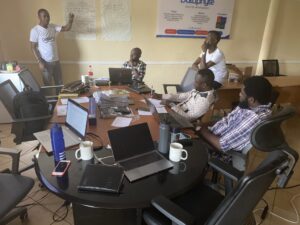Joshua Olufemi, founder of Dataphyte and former Director of Premium Times Centre for Investigative Journalism (PTCIJ) is a media management executive with experience in investigative journalism, open data advocacy, civic innovation, and media development in Nigeria.
In this interview with Lekan Otufodunrin, Olufemi shares his journey into media innovation and development work, opportunities for journalists in data-driven reporting and his organisation’s plans.
Being a graduate of Economics and Education, what was the background that prepared you for your past and present roles in media development and other governance issues?
I believe my love for actionable knowledge and solving problems prepared me for my lifelong roles in media development and civic innovation. I mostly invest time in learning things in order to improve the status quo and prepare for future needs. As a program officer with Institute for Media and Society in 2012, at the verge of returning millions of naira back because community radio licences were far in sight, I remember immersing myself in web surfing to find an alternative. That birthed the first set of online community radio broadcasting in six Niger Delta communities. The offshoot of this civic innovation knowledge inspired my launch of Light Behind Bars as a prison radio intervention for inmates in 2013.
Exploring my domain as a curriculum study and instructional technology (education) graduate, I thought to myself in 2014, six years before COVID-19 crippled education in Nigeria, what if we could hack education and never need the classrooms to learn in Nigeria. This made me launch Azure Consulting and then Azure Tutors. Today, the same University system that prepared me did not expand the knowledge to an actionable bandwidth such that it could deploy e-learning technology when it needed it the most.
In a nutshell, my love for knowledge that solves problems and foresees the future continues to pivot my engagement in media and development work.

What was the driving force behind the various social accountability and media development platforms you launched while at Premium Times Investigative Centre?
Media sustainability and Teamwork were the driving force. The dwindling revenue, capacity gaps and the inhibitive legal environment confronting journalism across West Africa were the major concerns of the Centre. The Centre as an institution within the subregion positioned itself to strategically respond with training and technology tools.
When the Centre launched in 2014, I had the task, on the one hand, to innovate techniques and technology that were pivotal to Premium Times’ media entrepreneurship and sustainability in Nigeria. On the other hand, to create a model that can be replicated as a response to the media crisis in West Africa.
To do this, we figured innovating across three elements – storytelling, distribution and revenue – will determine the growth and sustainability of a journalism enterprise. With a ‘learning’ and bonded team at my disposal, we cracked the code that combining accountability journalism with open data and civic technology can take a deliberate media organisation through sustainability.
So, if you study the platforms very well, you will see they mostly have these three elements – open data, civic technology and storytelling components to them. For instance, Udeme provisions budget data as a web platform to aid investigative journalism. Likewise, LeaksNG, deployed Anonymity technology to crowdsource leaks and tips from whistleblowers to aid collaborative journalism. With the success of Dubawa in Nigeria, we began the regional footprinting and launched in Ghana by using the replicable model of NextGen Media programme flagged in Nigeria as CampusReporterNG.
Overall, I believe the Centre has crossed the first developmental stage of its commitment and continues to maximise the resources at its disposal to drive social accountability and media innovation in the region.
In what ways will you say the platforms have contributed to the development of the media in the country?

Immensely I will say. Each of the eight platforms (while I led the Centre) have responded first to the capacity development needs of the media in Nigeria. From liberating budget data as a means or promoting investigative reporting, to natural resource reporting and fact-checking training, the platforms catalysed investigative and development reporting in Nigeria. Also, the Centre, through the CampusReporterNG has created a pathway for sustaining media professionalism and promoting media entrepreneurship in Nigeria. One of my most loved platforms in terms of impact to the development of media in Nigeria is the LeaksNG. This is because it is designed as a disruption to media competition. The long term goal of the platform is to enlist media trust and collaborative journalism, the first of its kind in the 100 years of newspapering in Nigeria.
In summary, the platforms have helped to respond to four key challenges facing the media in Nigeria – revenue, formats, competition, and practice.
How well will you say the Nigerian media have become data-driven in their publications and reporting?
I think the industry is evolving well when you look back to five years ago. Nevertheless, I will say the media industry is still at the awareness stage with respect to becoming data-driven in reporting and publication. At least three newspaper publications use infographics on the front page. Also, a number of online newspapers have continued to experiment with both still and dynamic data visualisations in their publications. That is a good beginning if you consider that no social research has proven its implication for revenue within the broader bouquet of formats. I believe that, as evidence shows the profitability of data-driven reporting, many newspapers will warm up to it and the genre will improve.
What should they improve on to have more impactful reports?
The media needs to do more telling than showing, period! One, do more evidence-based reporting and ground-truthing to be more impactful. Two, rethink the traditional formats of reporting and harness the “telling tools” of data, technology and user-generated or crowdsourced contents to improve storytelling and drive impactful reports.
Lastly and close to that is the need to innovate “form”. The media can do a lot of impactful reports if we move from the “bad news sells” to “good news tells”. Solution journalism should be embraced – learnt, experimented and resourced.
Why is data reporting crucial to improved reporting of issues now?
If you see data as the other most reliable source aside from personal capture of events or a primary source account of it, then you’d know how much it matters in storytelling. First, it is evidence-based. Second, it lends credibility to any story, third, it provides the opportunity to visually interpret or communicate your story using all the comparison and composition tools.
Moreso, data reporting provides an avenue to use data to describe each human reality in vivid and perhaps visually compelling ways. So from the numbers of children who don’t have access to vaccination to the number of pregnant women who can’t access antenatal healthcare, data journalism looks at it. It many times takes the big numbers such as the 10 trillion naira subsidy spent in Nigeria in 12 years and breaks it down to show citizens and policymakers how many primary schools, primary health centres or jobs the same money would have provided. Other times, it is narrating a timeline of human right abuses and visually presenting it for the purpose of holding perpetrators accountable. In essence, data reporting improves how we present or interpret social issues and broader human needs as units of measurement or indices.
READ ALSO: ‘HOW JOURNALISTS, MEDIA CAN ACCESS GLOBAL OPPORTUNITIES’
Overall, when you want to compare issues, present how an issue or event relates or connect to a whole, or when you are interested in showing the geographical or historical spread or trend of topic, theme or issue, it is important to think about data first.
What should the average Nigerian journalist do to enhance his or her data-reporting skills?
First is to have the passion and be ready to put in the work. The work mainly is learning the tools, tricks that are used in data journalism. This extends to familiarising yourself with the computer applications and research methods used by data journalists and then going the last mile to practice them. It is advisable to start with a small task and gradually move to the big ones.
I must emphasize that becoming a data journalist starts with learning the use of a spreadsheet usually called Microsoft Excel. I can say categorically that 80 per cent of the data journalism done in Nigeria and almost globally can be achieved with spreadsheet (MS Excel). This application can do data collection, cleaning (even though this depends on how dirty the data is), analysis and visualization.
When you have a perfect handle on Excel, you can then begin to advance to learning databases e.g SQL as well as advanced data analysis tools such as Microsoft Power BI, Tableau, Qlik, Flourish, R programming, JavaScript and Python.
Also, Dataphyte is offering training and technical support to anyone who is interested in becoming a data journalist or who is a practising data journalist. First, we go the extra mile to provide data to any journalists who need them for storytelling. Second, we connect them to funding opportunities for fieldwork when that is required. We recently provisioned story grants to six journalists interested in using procurement and treasury data for investigating COVID-19 spending. This is in partnership with the Public and Private Development Centre which is actually the organisation giving the grants while we provided data and training support.
Third, we provide editorial mentorship to help journalists realise their data reports. Also, we offer our data journalism platform, dataphyte.com, to any journalist to showcase their data journalism story. We are launching our data journalism bootcamps soon and we will be starting with student journalists across tertiary institutions in the country.
What other skills do you suggest journalists should acquire to enhance their media career?
Critical and analytical thinking skills are essentials. Though we think it is natural, it can be improved through learning. Also, social media, mobile and multimedia journalism skills are becoming the way to go. The COVID19 pandemic has shown us like other industries that remote is now renowned. So, the ability to collate and analyse social media (UGC) contents is now essential. Likewise, maximising your mobile gadgets to plan, prepare, publish and promote reports, has become an important skill for every journalist to enhance their career.
Eight months on with your new organization, are you making the impact in terms of filling the lacuna in data accessibility as you desired at inception?
Yes, we have outcomes that show we are on track. For instance, we have been responding to requests for data from journalists for their reporting. Also, we make it a point of duty to share processed data to journalists and newsrooms at various data journalism and capacity building programs we organise or attend. We provided a number of machine-readable data on our open data portal. We are currently processing and will soon publish on our open data portal, more socio-economic and development data to support the data needs of various accountability and advocacy organisations.
In what specific ways are you working with the media now and what are your future plans?
At the moment, we train journalists and newsrooms in the use of data for critical reporting. So far, we have worked with Daily Trust Foundation, Premium Times Centre, and PPDC to provide data journalism training on specialized or thematic issues such as COVID19 reporting, natural resource reporting, and public procurement.
We are also in talks with other newsrooms to help them set up their data journalism desk. At least three online and broadcast media have shown interests and we will commence the mentoring program in the last quarter of the year.


Any other thing you will want to talk about regarding the work of your organization?
Without doubt, policy and development planning is currently based on outdated datasets and often extrapolated estimates. As an intervention, Dataphyte was launched to provide the accountability and policy sectors with cleaner, analysed, easily-accessible and usable data to drive democracy and development in Nigeria. Dataphyte is a program of the Interactive initiative for Social Impact, aimed at supporting civil society and the public sector to use open data for advocacy, accountability and good governance in Nigeria.
The platform is a response to challenges of access to information confronting the demand side of accountability. On the other hand, it is an intervention to support the supply side, government to collect, publish and analyse information in forms that drive better decision making. With regards to supporting the open government in Nigeria, Dataphyte has reached out to four state governments to help them develop an open data platform.







Elizabeth Osayande
Really engaging and educative. Thank you sir for this interview.